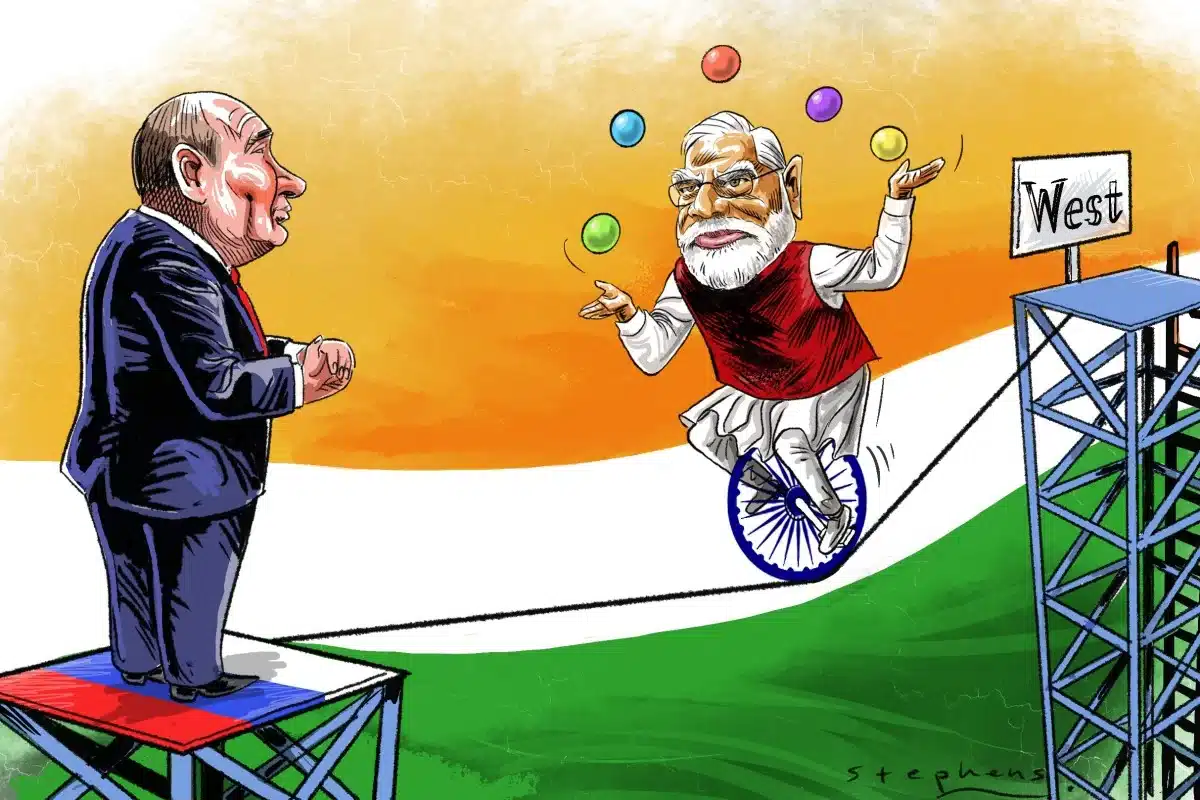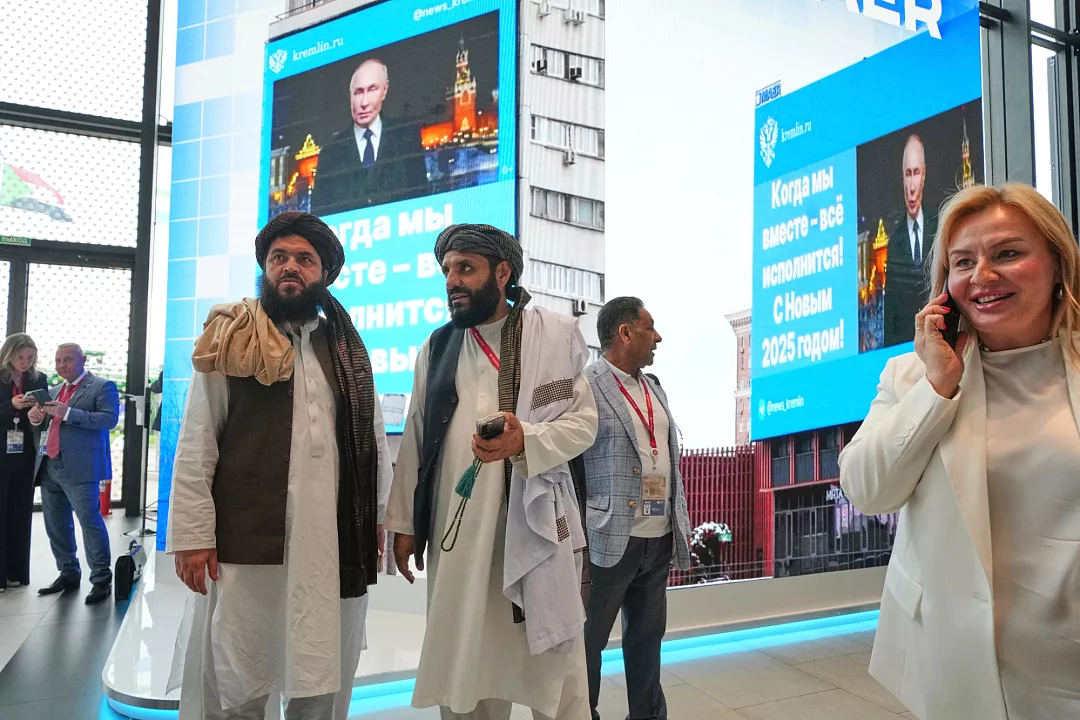Modi in Moscow – the utterance underscores how India is intricately navigating the geopolitical landscape as Russia’s war in Ukraine reshapes the global order. Prime Minister Narendra Modi’s visit to Moscow on 8th July 2024 marks his first visit since the beginning of the Russia-Ukraine conflict. The visit serves as a potent symbol of the enduring, albeit increasingly complex, relationship between the two nations. Western powers scrutinize this high-stakes diplomatic maneuver.
Modi’s Moscow visit highlights India’s determination to safeguard its own strategic imperatives. Moreover, it reflects a multipolar world with shifting alliances and unpredictable power dynamics.
A Strategic Window of Opportunity
The timing of Modi in Moscow is both significant and strategic. With a series of elections in the Western nations turning the gaze of their leaders inward, and the escalating conflict in Gaza drawing international attention away from Ukraine, India capitalized on a moment of geopolitical flux. This window of opportunity allowed Modi to engage with Putin. He did so without facing the immediate pressure and scrutiny that might have accompanied such a visit just months prior.
Countering the Russia-China Axis
Looming over Modi in Moscow was the specter of a burgeoning Russia-China axis. This partnership is fueled by shared grievances against the West and a desire to challenge the existing global order. Russia increasingly relies on China for economic and diplomatic support amid Western sanctions. This prompts India to grow wary of being sidelined in a relationship. The relationship significantly impacts India’s own security and regional influence. Chietigj Bajpaee, a senior South Asia research fellow at Chatham House, observes, ‘India is concerned about Russia’s relations with China, especially given China’s increased assertiveness in the region.’ Modi in Moscow served as a crucial counterbalance. The visit reassured Moscow of India’s enduring importance. It also sent a clear signal to Beijing that New Delhi will not hesitate to protect its own interests.
Navigating Dependence: India-Russia Defense Ties
Defense cooperation, a bedrock of the India-Russia partnership for decades, remained paramount during Modi’s visit. With approximately 60% of India’s military equipment still of Russian origin, New Delhi faces growing challenges in maintaining its arsenal. This is amidst war-related disruptions to global supply chains. ‘Defense cooperation will clearly be a priority area,’ emphasizes Bajpaee. He notes, ‘We’ve seen some delay in the deliveries of spare parts following the Russian invasion of Ukraine.’ Modi in Moscow provided a crucial platform to address these concerns. It facilitated negotiations on new arms deals and logistical agreements to circumvent sanctions. This is to ensure a steady flow of essential military hardware.
See Also: Russia supplies $13 billion worth arms to India in last 5 years: Reports
Balancing Energy Needs and Diplomatic Pressures
Beyond defense, the visit also highlighted India’s pragmatic approach to energy security.
Since the war in Ukraine began, India has become a major importer of discounted Russian oil, capitalizing on favorable prices to meet the demands of its booming economy. This strategic maneuver, while drawing criticism from some Western nations advocating for a global embargo on Russian energy exports, underscores India’s commitment to prioritizing its own economic well-being. Bilateral trade between the two countries reached an unprecedented $65.7 billion in the 2023-24 financial year, with over 40% of India’s oil imports now originating from Russia.
Strategic Autonomy in a Multipolar World
Despite the optics of Modi in Moscow, India has consistently maintained that its engagement with Russia does not equate to an endorsement of its actions in Ukraine. New Delhi has repeatedly called for a negotiated settlement to the conflict and abstained from condemning Russia outright at international forums. This commitment to strategic autonomy, a cornerstone of India’s foreign policy since independence, allows it to forge alliances based on pragmatism rather than ideology, prioritizing its own national interests over allegiance to pre-existing geopolitical blocs.
This strategic autonomy is on full display in the carefully choreographed dance of international diplomacy surrounding Modi’s Moscow visit. His presence in Moscow coinciding with the NATO summit in Washington sends a clear message: India will not be dictated to by any bloc and will engage with powers across the spectrum to secure its interests. This stance is further underlined by Modi’s decision to skip the SCO summit, a move interpreted by some as a subtle distancing from a bloc increasingly dominated by China.
Modi in Moscow, therefore, represents a carefully calibrated gamble. By engaging with a nation increasingly isolated by the West, India seeks to safeguard its own interests in a multipolar world marked by uncertainty and shifting alliances. It remains to be seen whether this gamble will yield long-term dividends. However, what is clear is that India, a rising power with global ambitions, is determined to chart its own course, leveraging its relationships, however complex they may be, in navigating the turbulent currents of 21st-century geopolitics.
This news story is covered by Najam ul Hassan, Junior Research Associate at South Asia Times (SAT).




![Afghan men search for victims after a Pakistani air strike hit a residential area in the Girdi Kas village, Nangarhar province on February 22, 2026. [Aimal Zahir/AFP/Getty Images]](https://southasiatimes.org/wp-content/uploads/2026/02/gettyimages-2262391441.webp)

